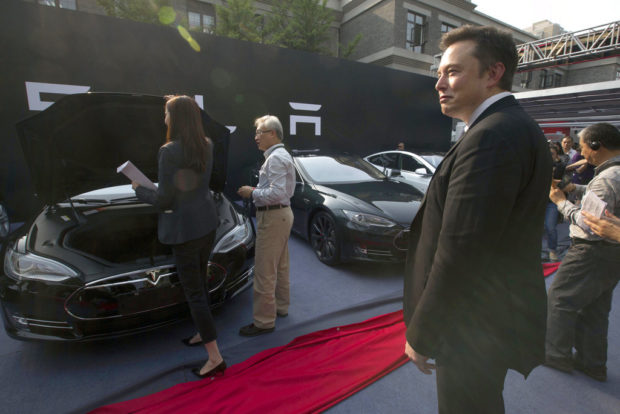
In this April 22, 2014, file photo. Tesla Motors CEO Elon Musk, right, looks on as a set of Tesla Model S sedans are delivered to its first customers in China at an event in Beijing. AP
BEIJING — Tesla Inc. broke ground Monday for a factory in Shanghai, its first outside the United States.
CEO Elon Musk said Monday on Twitter that the company will start production in China of its Model 3 and a planned crossover by the end of the year.
Tesla announced plans in July to build the Gigafactory 3 facility in China, the biggest electric vehicle market, despite trade tension between Beijing and Washington. That followed Beijing’s announcement it would end restrictions this year on foreign ownership of electric vehicle producers in an effort to spur industry development.
“Looking forward to breaking ground on the @Tesla Shanghai Gigafactory today!” said Musk on Twitter. “Aiming to finish initial construction this summer, start Model 3 production end of year & reach high volume production next year.”
China’s state broadcaster CCTV showed Musk and other Tesla and local officials attending a chilly ceremony in the rain Monday in Shanghai’s outskirts.
The Shanghai factory will produce “affordable versions of 3/Y for greater China,” Musk said. The company refers to a planned crossover that has yet to receive a formal name as the Y.
Higher-priced models will be built in the United States for export to China, Musk said.
Tesla, based on Palo Alto, California, global automakers including General Motors Co., Volkswagen AG and Nissan Motor Corp. that are pouring billions of dollars into manufacturing electric vehicles in China.
Local production would eliminate risks from tariffs and other import controls. It would help Tesla develop parts suppliers to support service and make its vehicles more appealing to mainstream Chinese buyers.
Tesla said in October it had signed an agreement for a 210-acre (84-hectare) site in the Lingang district in southeastern Shanghai.
Shanghai is a center of China’s auto industry and home to state-owned Shanghai Automotive Industries Corp., the main local manufacturer for GM and VW.
Tesla has yet to give a price tag but the Shanghai government said it would be the biggest foreign investment there to date.
The company faces competition from Chinese brands including BYD Auto and BAIC Group that already sell tens of thousands of hybrid and pure-electric sedans and SUVs annually.
Until now, foreign automakers that wanted to manufacture in China were required to work through state-owned partners. Foreign brands balked at bringing electric vehicle technology into China to avoid having to share it with potential competitors.
The first of the new electric models being developed by global automakers to hit the market, Nissan’s Sylphy Zero Emission, began rolling off a production line in southern China in August.
Lower-priced electric models from GM, Volkswagen and other global brands are due to hit the market starting this year, well before Tesla is up and running in Shanghai. /ee